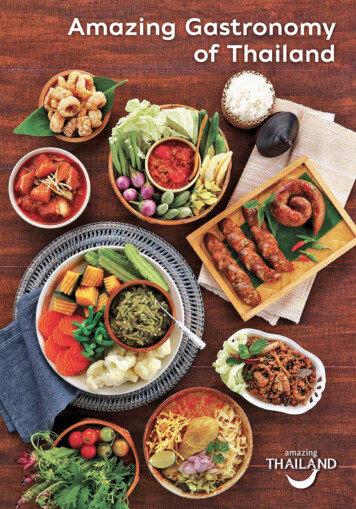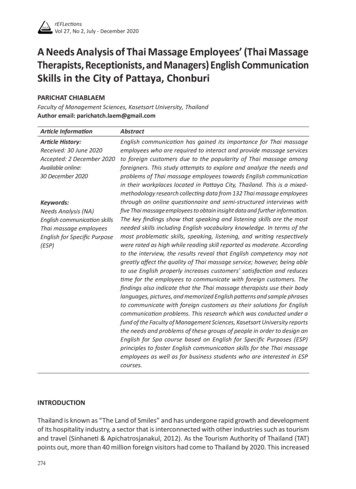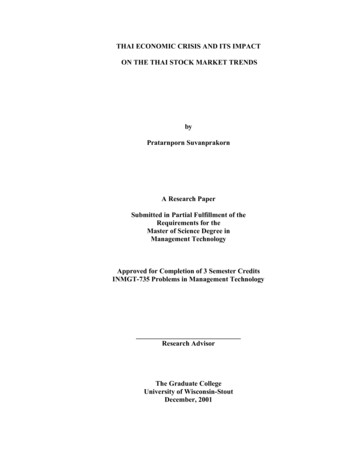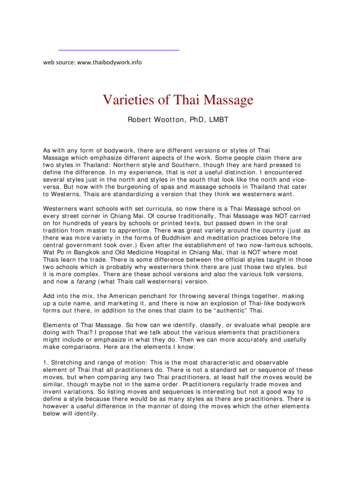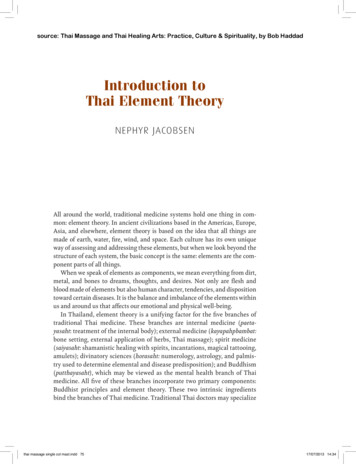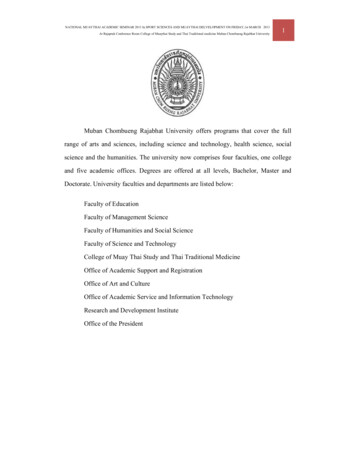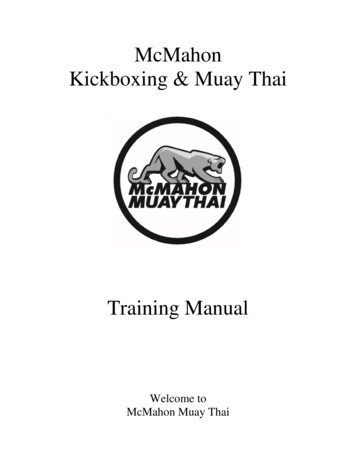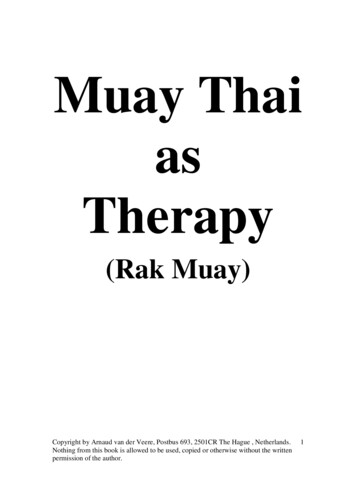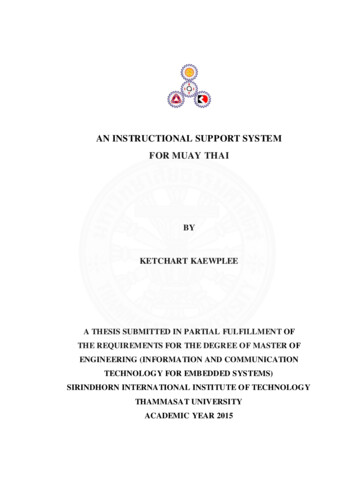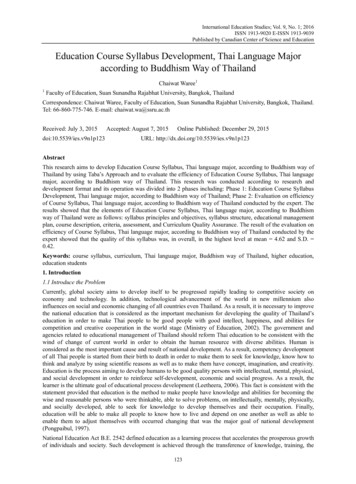
Transcription
International Education Studies; Vol. 9, No. 1; 2016ISSN 1913-9020 E-ISSN 1913-9039Published by Canadian Center of Science and EducationEducation Course Syllabus Development, Thai Language Majoraccording to Buddhism Way of ThailandChaiwat Waree11Faculty of Education, Suan Sunandha Rajabhat University, Bangkok, ThailandCorrespondence: Chaiwat Waree, Faculty of Education, Suan Sunandha Rajabhat University, Bangkok, Thailand.Tel: 66-860-775-746. E-mail: chaiwat.wa@ssru.ac.thReceived: July 3, 2015doi:10.5539/ies.v9n1p123Accepted: August 7, 2015Online Published: December 29, 2015URL: http://dx.doi.org/10.5539/ies.v9n1p123AbstractThis research aims to develop Education Course Syllabus, Thai language major, according to Buddhism way ofThailand by using Taba’s Approach and to evaluate the efficiency of Education Course Syllabus, Thai languagemajor, according to Buddhism way of Thailand. This research was conducted according to research anddevelopment format and its operation was divided into 2 phases including: Phase 1: Education Course SyllabusDevelopment, Thai language major, according to Buddhism way of Thailand; Phase 2: Evaluation on efficiencyof Course Syllabus, Thai language major, according to Buddhism way of Thailand conducted by the expert. Theresults showed that the elements of Education Course Syllabus, Thai language major, according to Buddhismway of Thailand were as follows: syllabus principles and objectives, syllabus structure, educational managementplan, course description, criteria, assessment, and Curriculum Quality Assurance. The result of the evaluation onefficiency of Course Syllabus, Thai language major, according to Buddhism way of Thailand conducted by theexpert showed that the quality of this syllabus was, in overall, in the highest level at mean 4.62 and S.D. 0.42.Keywords: course syllabus, curriculum, Thai language major, Buddhism way of Thailand, higher education,education students1. Introduction1.1 Introduce the ProblemCurrently, global society aims to develop itself to be progressed rapidly leading to competitive society oneconomy and technology. In addition, technological advancement of the world in new millennium alsoinfluences on social and economic changing of all countries even Thailand. As a result, it is necessary to improvethe national education that is considered as the important mechanism for developing the quality of Thailand’seducation in order to make Thai people to be good people with good intellect, happiness, and abilities forcompetition and creative cooperation in the world stage (Ministry of Education, 2002). The government andagencies related to educational management of Thailand should reform Thai education to be consistent with thewind of change of current world in order to obtain the human resource with diverse abilities. Human isconsidered as the most important cause and result of national development. As a result, competency developmentof all Thai people is started from their birth to death in order to make them to seek for knowledge, know how tothink and analyze by using scientific reasons as well as to make them have concept, imagination, and creativity.Education is the process aiming to develop humans to be good quality persons with intellectual, mental, physical,and social development in order to reinforce self-development, economic and social progress. As a result, thelearner is the ultimate goal of educational process development (Leetheera, 2006). This fact is consistent with thestatement provided that education is the method to make people have knowledge and abilities for becoming thewise and reasonable persons who were thinkable, able to solve problems, on intellectually, mentally, physically,and socially developed, able to seek for knowledge to develop themselves and their occupation. Finally,education will be able to make all people to know how to live and depend on one another as well as able toenable them to adjust themselves with occurred changing that was the major goal of national development(Pongpaibul, 1997).National Education Act B.E. 2542 defined education as a learning process that accelerates the prosperous growthof individuals and society. Such development is achieved through the transference of knowledge, training, the123
www.ccsenet.org/iesInternational Education StudiesVol. 9, No. 1; 2016preservation of culture, the creation of academic advancement and knowledge, the promotion of the effectivemanagement of the learning environment, and the support of lifelong learning. The ultimate aims of educationare to transform Thai citizens into perfect human beings, having good health, wholesome minds, intelligence,knowledge, morality, good behavior and cultural life. Educational process for developing humans and societythrough training, cultural inheritance, and academic advancement and they must be able to live with other peoplehappily (Ministry of Education, 2002).Thai language is official language of Thailand that is important for all Thai people. In addition to being acommunication tool for making understanding, Thai language is also the tool expressing Thainess and culturalheritage. Moreover, it is also the important tool leading to learning and knowledge seeking as well as thefoundation for learning other languages according to the speech of Her Royal Highness Princess Maha ChakriSirindhorn regarding education as shown below: (Debaratanarajasuda, 1999). “.education influencing onnational development. As a result, the instruction of Thai language should be provided from primary school inorder to enable learners to have sufficient knowledge and abilities for living and have basic education for furthereducation. As a result, abilities and understanding in Thai language should be in good level. I used to hearsomeone said that people who are excellent in mathematics and science often have poor language skills whilepeople who have excellent language skills often have poor understanding on mathematics and science. However,what I have been seen is not true. What I have been perceived is that people with poor language skills are alwayspoor with other subjects because have poor understanding in language so it’s hard to teach them to understandcompletely.”The above speech of Her Royal Highness Princess Maha Chakri Sirindhorn represented the speech of currenteducation and Royal Highness Princess Maha Chakri Sirindhorn also considered language as the important toolleading to learning. Moreover, she also kindly provided a speech on Thai language promotion and maintenanceas follows:“Thai language instruction is very important in motivating and promoting learners to have pride and values inusing correct Thai language. As a result, it is proper to seek for the guidelines for promoting Thai instruction tobe interesting and fun. We are able to promote Thai people’s knowledge tank by using Thai language as themedia for promoting and supporting learners to love reading and seeking for additional knowledge. This willreinforce students to seek for knowledge and use Thai language correctly and properly that is the very importantfactor for national development. All people related to Thai language instruction should pay attention to effectiveThai language instruction in order to enable learners to have correct knowledge on Thai language and love Thailanguage.”National Thai Language Day is on the 29th date of July of every year and Thai government declared such day asthe important day in1999 for reminding an event occurred on July 29th, 1962, when His Majesty King BhumibolAdulyadej participating in the discussion on “Problems in Thai Usage” with some experts at the Faculty of Arts,Chulalongkorn University. There was a part of royal speech stated that “.We are fortunate that we have had ourown unique language since ancient times. It should therefore be carefully preserved. This can be accomplished inseveral ways. The purity of pronunciation should be maintained with great accuracy. Words should be usedappropriately in sentences. The key issue is the richness of the Thai language. We should not think that the Thailanguage is somehow inadequate and that we frequently need to create new words. Although some new wordsmay be necessary for technical or academic usage, most words should remain simple. We should use the wordsthat already exist and not add complications by creating new words.”1.2 Explore Importance of the ProblemAccording to the King’s speech on Thai language during 1962–2008, Academic Network for CommunityHappiness Observation and Research of Assumption (ABAC) University conducted a survey research on“Knowledge and Understanding of Thai People on National Thai Language Day and Problems in Thai Usage”.The data was collected from 2, 452 samples with the age of 18 years and over who were living in Bangkok andsurroundings. The results showed that 21.5% of them had never known that there are 44 letters of Thai languageand 86.7% of them had never known how many vowels of Thai language are (21 vowels). In addition, 73.7% ofthem had never known how many intonation marks of Thai language are (4 tonal marks 5 tones) and 92.4% ofthem had never know what prose is (a form of language that exhibits a grammatical structure and a natural flowof speech rather than a rhythmic structure) while 89.6% of them had never known what verse is (verse isformally a single metrical line in a poetic composition).For reinforcing learners to have knowledge and abilities in Thai language for using as the tools for learning othersubjects, since all Rajabhat Universities in Thailand recognize the importance of Thai language, they provide124
www.ccsenet.org/iesInternational Education StudiesVol. 9, No. 1; 2016Thai language instruction for the first year students as the first learning group used by the universities as thefoundation for preparing instructional management to all students in all faculties in order to build the foundationof reading, thinking, and using as the further strategies.In the Seminar for analyzing the curriculum and determining the Thai language curriculum framework ofRajabhat Universities, the Curriculum Development Center indicated that the current Thai language curriculumaims to enable the learners to have listening, speaking, reading, and writing skills consistently by emphasizing onknowledge and understanding in advanced Thai language. The learners must love reading, and be fostered withdesirable characteristics for learning Thai language, literature, and national culture (Sakdanarong, 1996).From the operation of Thai language instruction according to the curriculum of Rajabhat Universities, it wasfound that Thai language is currently the language with the highest level of criticism. Although Thai language isdefined as the prescribed course of Education Course Syllabus of Rajabhat Universities that all students arerequired to study, it was found that the learning achievement of Thai language instruction of students was quitelow and classified in unsatisfied level. From this research, it was found that the mostly found problems on Thaiusage of students were incorrect word choice, wrong pronunciation of letters, vowels, intonation marks, anddiphthong. In addition, there are some foreign languages used as the substitutes of Thai words. For writing, itwas found that most students write Thai words wrongly because they write Thai words upon pronunciation andthey also use some short terms sued in specific groups (Vihokto, 2009) From the study of Ministry of UniversityAffairs conducting regression analysis with the evaluation’s results, it was found that The advancement rate ofThai language was quite low or at 1% that was unsatisfying (Ministry of University Affairs, 2001). In addition,the research of Department of Curriculum and Instruction Development also found that Thai language wasdisliked by most students due to its difficult contents, teacher’s instruction, attitude of students, and behaviors ofstudents. Moreover, students also considered that instruction of Thai language on Thai grammar, verse, andliterature was not useful for daily life therefore they paid no attention to the importance of Thai language.The second desirable skills and characteristics according to Education Course Syllabus of Suan SunandhaRajabhat University or language skills identifying that the learners had communication skills and abilities forcommunicating with other people correctly and properly. They were confident and had better speaking andthinking skills Education Course Syllabus of Suan Sunandha Rajabhat University (Faculty of Education, 2006).Way of life and culture of Thai people has been instructed by Buddhist teaching since the first establishment ofThailand. It could be said that Buddhist way is the cultural way of most Thai people until it turns to be theuniqueness that is accepted globally. Buddhism is the knowledge emphasizing on enabling humans to understandnature of the world and life. Consequently, humans would be able to live their lives correctly and properly, i.e.,having well-being and pure life. As a result, the individuals who study and comply with Buddhist teaching willbe happy and able to make surrounding people and society happy together. Buddhist teaching is the educationalsystem divided into 3 elements called Three Studies (Morality, Concentration, and Wisdom) that is the trainingsystem leading to behavioral, physical, mental, and intellectual development. As a result, Three Studies cover allaspects of living from easy ones to complex ones. Consequently, it is the most complete education systemenabling people to be god, clever, and happy.In ancient times, children children’s education based on Buddhist teaching and all children held the Buddhistteaching as their way of life according to the good Buddhist way for making merit, observing the precepts,practicing the Dharmma, listening to Dharmma, practicing themselves to eliminate lust. Their daily life wasclose and related to temples and the temples are the important learning centers of the community. Buddhist HolyDay was the important day for their spirit because it was the day of making merit. In Buddhist Holy Day,Buddhists stop performing all bad or inimical working, for example, omitting animal killing, and omitting allvices, etc. Some Buddhists have strong faith towards Buddhist Holy Day therefore they worn white dress andheld eight commandments. In free time, they discussed Dhamma altogether and practiced themselves accordingto Buddha’s teaching. Children saw the adults as their models therefore they complied with those practicesleading to pleasant society. When considering on the new generations who are taught by western knowledge,current Thai people live their lives distantly from Buddhist teaching, temples, and religion. Nowadays, if we askThai people when the Buddhist Holy Day is, most of them would be speechless with no answer because they payno attention to this day. Nowadays, it is the proper time that Buddhists should hold the Buddhist teaching as theprinciples of their way of life for having beautiful life and maintaining the Buddhist teaching that is the nationaltreasure and the foundation of Thailand from the ancient times.Since the researcher considered on such importance, the researcher prepared the plan for developing EducationCourse Syllabus, Thai language major, according to Buddhism way of Thailand as the guidelines for developing125
www.ccsennet.org/iesInternationnal Education StuudiesVol. 9, No. 1; 2016curriculumm and reformiing education by holding tthe suitable principles, theoories, and techhniques with Thaicontext beecause the truee practice for eeducational refform is preservving the good and identical eexisting guidellines.However, some guideliines or processses must be adjusted and amended to be modern annd consistent withchanging ssocial and econnomic conditioons.1.3 State HHypotheses andd Their Corresspondence to RResearch Desiggn1) To deveelop Educationn Course Syllabbus, Thai languuage major, acccording to Buuddhism way oof Thailand.2) To evaluuate the efficieency of Educaation Course Syyllabus, Thai llanguage majoor, according too Buddhism way ofThailand.2. Methodd2.1 Scope of Researchwas 5 educatiional supervisors and admiinistrators whho were skillfuful inThe targett group of thhis research winstructionnal managemennt of Thai langguage obtainedd from using ppurposive sammpling. They wwere responsiblle formanaging instruction of Thai languagee on curriculumm development of Suan Sunaandha Rajabhaat University.Figure 11. Assumptive or hypothesis model of the sstudent’s capacity accordingg to Education Course SyllabusourseFactors afffecting the capacity of stuudents teacherr in Thai langguage major according to Education CoSyllabus aare Dharmar Inntellect, culturee, virtue and etthics.2.2 Expectted Benefits1) To obtaain the guidelinnes on learningg managementt for student teeachers studyinng in Thai majjor as the protootypecurriculumm.2) Knowledge obtainedd from this reesearch wouldd be useful ffor teachers oor anyone inteerested to devvelopEducation Course Syllabbus of other maajors.126
www.ccsenet.org/iesInternational Education StudiesVol. 9, No. 1; 20162.3 Research ProcessDevelopment of Education Course Syllabus, Thai language major, according to Buddhism way of Thailand wasconducted by using Taba’s Approach divided into 7 stages as follows:I) Diagnose demands obtained from conducting the structural interview with 10 Thai language teachers withexperience on Thai language teaching not less than 5 years and students from faculty of Education who passedThai language learning for at least 1 course for determining the curriculum.II) Determine the curriculum objectives and learning objectives from analyzing basic data.1) Submit the draft of curriculum objectives and learning objectives to the experts included with 5 curriculumdevelopers and 5 educators for evaluating.2) Obtain the results, approval, and suggestions of the draft evaluation from the experts. Amend some statementsto explain learning behavior properly.III) Select curriculum’s contents1) Outline the contents from analyzing basic data document on Thai language, cooperative learning management,and basic data analysis. The determined contents must be consistent with learning objectives and the learnergroup. For selection, the following issues should be considered:Issue 1: The contents must provide learners knowledge on background of Thai language.Issue 2: The contents must enable learners to learn the guidelines for developing desirable characteristics forusing Thai language in various aspects.2) Submit the selected draft to the experts for evaluating and the experts are consisted of 5 curriculum and Thailanguage instructional developers.3) Obtain the results, approval, and suggestions of the draft evaluation from the experts. Amend some statementsto be correct and add some contents.IV) Contents ordering1) Outline the contents by ordering the selected contents in section 3 to manage the contents to meet withdetermined learning objectives. Determine proper duration of each content properly by considering on itscontinuity, difficulty, maturity, abilities, and interest of learners.2) Submit the ordered contents to the experts consisted of 5 curriculum and Thai language instructionaldevelopers for evaluating.3) Obtain the evaluation results on content ordering from the experts and those results were consistent in goodlevel.V) Select experiences1) Outline learning experience by selecting from learning experiences and the related persons or teachers mustselect learning experience to be consistent with subject contents and curriculum objectives by emphasizing onstudent-centered instruction process and instruction management according to Buddhism way of Thailand, forexample, self-study, group discussion, and cooperative instruction, by exchanging knowledge, learning, andhelping one another.2) Submit the draft of selected learning experience to the experts consisted of 5 curriculum developers forevaluating.3) Obtain the results of evaluation from the experts and the experts agreed with the draft in good level.VI) Order stages, amend, and improve the learning experiences by considering on contents, continuity, andabilities of the learners for providing proper training.VII) Determine what to be evaluated and evaluation methods as follows: (1) what to be evaluated, i.e., EducationCourse Syllabus, Thai language major, according to Buddhism way of Thailand consisted of curriculum contents,curriculum resources, curriculum management, and results obtained from curriculum management; (2) methodsfor evaluating Education Course Syllabus, Thai language major, according to Buddhism way of Thailand, i.e.,evaluated nu the experts, evaluated by 5-rating scale questionnaire asking about quality of training curriculum.The quality of questionnaire on content validity was analyzed by analyzing the consistency of evaluationchecklist and comments of 5 experts (IOC) as well as analyzing the quality of questionnaire on reliability.127
www.ccsenet.org/iesInternational Education StudiesVol. 9, No. 1; 20163. ConclusionThe results of development of Education Course Syllabus, Thai language major, according to Buddhism way ofThailand were as follows:Part 1: Results of development of Education Course Syllabus, Thai language major, according to Buddhism wayof Thailand obtained by using Taba’s Approach (1972).The results of development of Education Course Syllabus, Thai language major, according to Buddhism way ofThailand obtained by using Taba’s Approach (1972) were consisted of curriculum objectives and learningobjectives. The curriculum contents were determined and ordered. Subsequently, the duration was defined andexperiences were selected and ordered. Determine what to be evaluated and methods of evaluation.Part 2: Results of evaluation of efficiency of Education Course Syllabus, Thai language major, according toBuddhism way of Thailand obtained by using experimental research.The results of evaluation of efficiency of Education Course Syllabus, Thai language major, according toBuddhism way of Thailand, performed by the experts showed that the curriculum was in overall in the highestlevel. When considering on each aspect, it was found that course description had the highest quality followed byeducational management plan, curriculum objectives, curriculum quality assurance, and curriculum structure,evaluation, measurement, and principles, respectively.Table 1. The quality of Education Course Syllabus, Thai language major, according to Buddhism way ofThailand by expertsListmeanS.D.interpretationSyllabus Syllabus structure4.600.29highestEducational management plan4.800.45highestCourse description4.840.33highestCriteria and assessment4.430.51highestCurriculum Quality . The result of the evaluation on efficiency of Course Syllabus, Thai language major, according to Buddhismway of Thailand conducted by the expert showed that the quality of this syllabus was, in overall, in the highestlevel at mean 4.62 and S.D. 0.42.Table 2. State criteria for evaluating: Likert .20Average2.61-3.40Low1.81-2.60Lowest1.00-1.804. Discussion1) Discuss on the results of development of Education Course Syllabus, Thai language major, according toBuddhism way of Thailand obtained by using Taba’s Approach (1972) consisted of curriculum objectives andlearning objectives. The curriculum contents were determined and ordered. Subsequently, the duration wasdefined and experiences were selected and ordered. Determine what to be evaluated and methods of evaluation.These were consistent with the results obtained by (Taba, 1972) proposing the procedures of curriculumdevelopment as follows: (1) Diagnose demands; (2) Determine the educational objectives as demanded by the128
www.ccsenet.org/iesInternational Education StudiesVol. 9, No. 1; 2016society; (3) Select subject contents and knowledge that must be taught by teachers for providing demands metwith necessity of the society; (4) Order procedures, amend, and improve selected contents; (5) Select learningexperiences using for reinforcing contents and processes to be complete and consistent with objectives; (6)Organize, order procedures, amend, and improve learning experiences; (7) Evaluate the results of the curriculumthat was consisted with the work of Sa-ngad Utranant (2004) proposing the procedures of curriculumdevelopment as follows: (1) analyze basic data; determine objectives; (3) Select and order contents; (4)Determine measurement and evaluation; (5) implement the curriculum; (6) Evaluate the results of curriculumutilization; (7) Amend and improve curriculum.2) Discussion on the results of evaluation of efficiency of Education Course Syllabus, Thai language major,according to Buddhism way of Thailand, performed by the experts. The experts found that the curriculum was inoverall in the highest level that was consistent with the work of (Taba, 1972) stated that the curriculum wasconsisted of 4 elements including general objectives and course objectives, contents and course hours,,instructional processes, and learning results evaluation according to curriculum. In addition, it was alsoconsistent with the work of (Khunakorn, 1995) who divided the elements of the curriculum into 5 elementsincluding general objectives, course objectives, course hours, instructional processes, evaluation uponcurriculum, and curriculum improvement. In addition, it was also consistent with the work of (Jewpanich, 2015)that (1) the PBL-DLL SoMe Model used for enhancing problem solving skills of undergraduate in educationstudent, consists of 4 components which are 1) the analysis of the readiness of the input factors, 2) the process ofthe PBL-DLL SoMe Model, 3) the evaluation of the achievement of learning and problem solving skills (Output),and 4) the evaluation of the result between evaluating and feedback.5. Suggestions1) There should be some further researches on follow –up of the results of curriculum after implementation andthe results in long-term implementation in order to study whether the students had development and changing ontheir Thai language usage and how.2) There should be some further researches on curriculum development by utilizing concepts and techniques ofpreparing activities in other forms in order to discover the appropriate training format for various contexts.3) There should be curriculum development conducted with students in other faculties of the university in orderto develop and apply obtained knowledge and abilities on Thai language to learning and communicationproperly.6. Definitions1) Education Course Syllabus, Thai language major means a document defining the terms of experiences forusing as the guidelines for ordering the experiences in order to enable learners of teaching profession to beprogressed with knowledge on Thai language. The necessary elements of the curriculum were consisted ofobjectives divided into general objectives and course objectives, contents, learning experiences, facts andknowledge, concepts and principles, problem solving and creativity, physical skills, attitudes, values, andevaluation.2) Buddhism way of Thailand means educational management for developing overall quality of life of thelearners including morality, ethics, and life perception with intellect, wise, literacy, and other aspects of livingemphasizing on eating, living, listening, and watching. It is the natural way of life and correct living in order toprovide actual benefits by using the Buddhist principles as the guidelines for operation, managerial services ineducational institutes, curriculum management, learner development activities, and other activities, in order todevelop Thai youth on their behaviors, mentality, and intellect according to Three Studies.AcknowledgmentsThis research was supported by Suan Sunandha Rajabhat University and National research council of Thailand.Special thanks you to all experts of SSRU who helped and supported this project.ReferencesDebaratanarajasuda. (1999). Includes lectures, educational in Princess Maha Chakri Sirindhorn of Thailand.Bangkok: Foundation of Princess Maha Chakri Sirindhorn.Faculty of Education. (2006). Education Course Syllabus of Suan Sunandha Rajabhat University. Bangkok:Suan Sunandha Rajabhat University Printing.Jewpanich, C., & Piriyasurawong, P. (2015). Project-Based Learning Using Discussion and Lesson-LearnedMethods via Social Media Model for Enhancing Problem Solving Skills. International Education Studies,129
www.ccsenet.org/iesInternational Education StudiesVol. 9, No. 1; 20168(6), 24.Khunakorn, S. (1995). Curriculum and instruction (4th ed.). Bangkok: Chanuan Printing.Leetheera, S. (2006). Effects of train the brain’s ability to critical thinking by theory of intelligence SternbergHindenburg on the ability to critical thinking (Pratomsuksa 6 students, thesis. M.Ed., SrinakharinwirotUniversity, Bangkok).Likert, R. A. (1961). New Patterns of Management. New York: McGraw-Hill Book Company Inc.Ministry of Education, Thailand. (2002). Basic Education Curriculum. B.E. 2544 (A.D. (2001) (Trans. Chavalit,M)). Bangkok: Express Transportation of Thailand.Ministry of University Affairs. (2001). Policies and procedures for assessing the quality of higher education.Office of the Higher Education University Affairs.Pongpaibul, P. (1997). “The model of teaching Buddha religion” in the heart of the Religious Education tofoundation (pp. 111-112). Bangkok: Pikkhanate Printing Center.Sakdanarong, N. (1996). The last straw. Bangkok: Ton or Grammy.Taba, H. (1972). Curriculum Development: Theory and Practice. New York: Brace & World Inc.Vihokto, P. (2009). The synthetic of the pattern development of children’s self-control Thailand.
efficiency of Course Syllabus, Thai language major, according to Buddhism way of Thailand conducted by the expert showed that the quality of this syllabus was, in overall, in the highest level at mean 4.62 and S.D. 0.42. Keywords: course syllabus, curriculum, Thai language major, Buddhism way of Thailand, higher education, education students 1.
